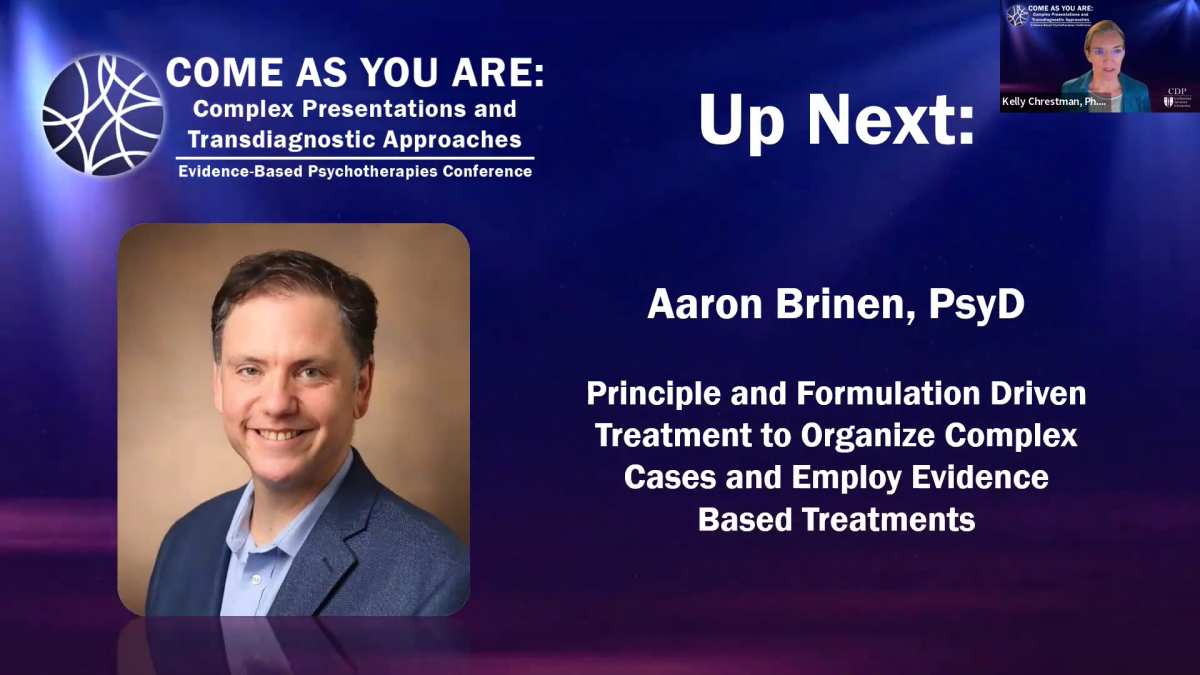The Center for Deployment Psychology hosted our fourth annual Evidence-Based Psychotherapy conference, online via Zoom, 9 May 2024 with optional pre-meeting institutes: Prolonged Exposure Therapy, Motivational Interviewing Skills, and Cognitive Behavioral Therapy for Insomnia 7-8 May 2024. This year, our theme was Come As You Are: Complex Presentations and Transdiagnostic Approaches..
The EBP Conference is designed for behavioral health providers from all disciplines, including psychologists, psychiatrists, clinical social workers, counselors, marriage and family therapists, and nurse practitioners. The conference should be of particular interest to those involved in the dissemination and implementation of evidence-based psychotherapies, such as internship and resident training directors and faculty, clinical supervisors and consultants, clinic managers, academic instructors who teach other behavioral health providers to provide best practices and evidence-based care as well as front line providers.
If you weren't able to join us for the live event, we are happy to be able to provide recordings of each of the presentations. Click on any of the below titles to view a video of the presentation. Please note, the below recordings are for informational purposes only and do NOT include CE credits.
Click here to visit the 2025 EBP Conference Archive.
Click here to visit the 2023 EBP Conference Archive.
Click here to visit the 2022 EBP Conference Archive.
Click here to visit the 2021 EBP Conference Archive.
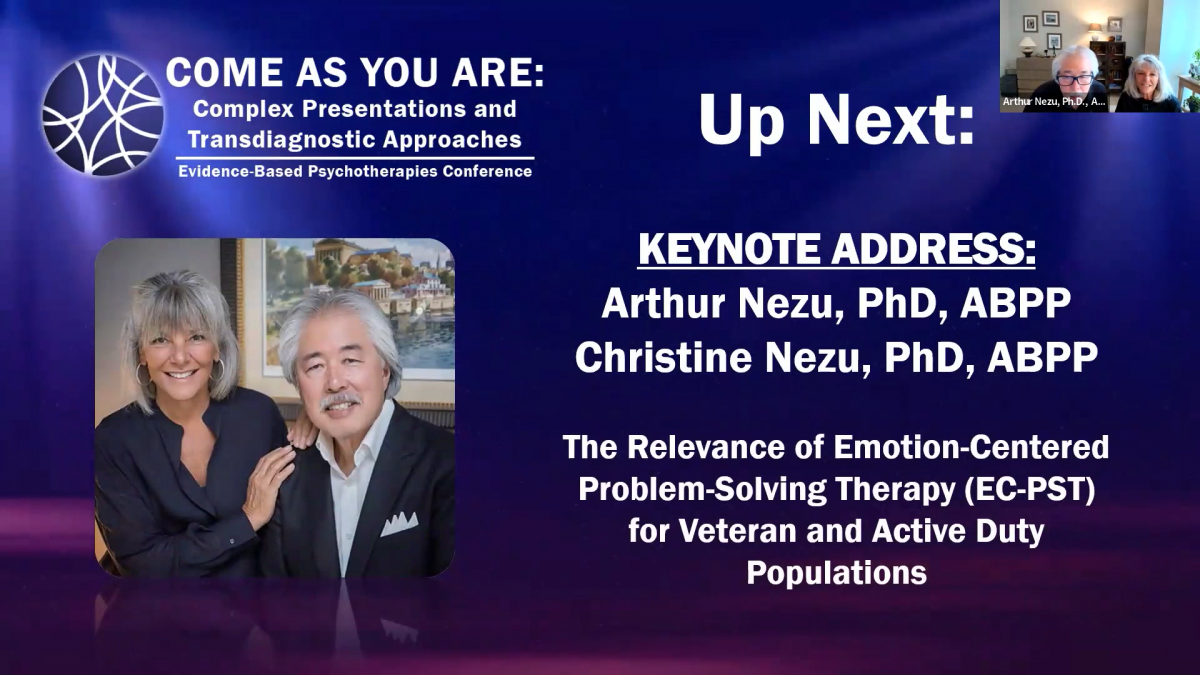 The Relevance of Emotional-Centered Problem-Solving Therapy (EC-PST) for Veteran and Active Duty Populations by Arthur Nezu, Ph.D. ABPP, and Christine Nezu, Ph.D., ABPP:
The Relevance of Emotional-Centered Problem-Solving Therapy (EC-PST) for Veteran and Active Duty Populations by Arthur Nezu, Ph.D. ABPP, and Christine Nezu, Ph.D., ABPP:
Emotion-Centered Problem-Solving Therapy (EC-PST) is an evidenced-based intervention whose conceptual roots are based in social learning theory. It involves teaching people various skill sets geared to foster resilience and adjustment in handling significant stress emanating from problems in living. Clinical treatment goals include managing “cognitive overload,” fostering positive motivation and persistence, overcoming negative emotional reactions, and developing a systematic approach to coping with stress. Recent research and program development efforts have increasingly focused on the use of EC-PST with Veteran and active duty populations. The emphasis of the presentation will be clinical applications of EC-PST, including suicide prevention. We will discuss the clinical components and toolkits that comprise EC-PST as well as the importance of identifying obstacles to personal goals when using the intervention.
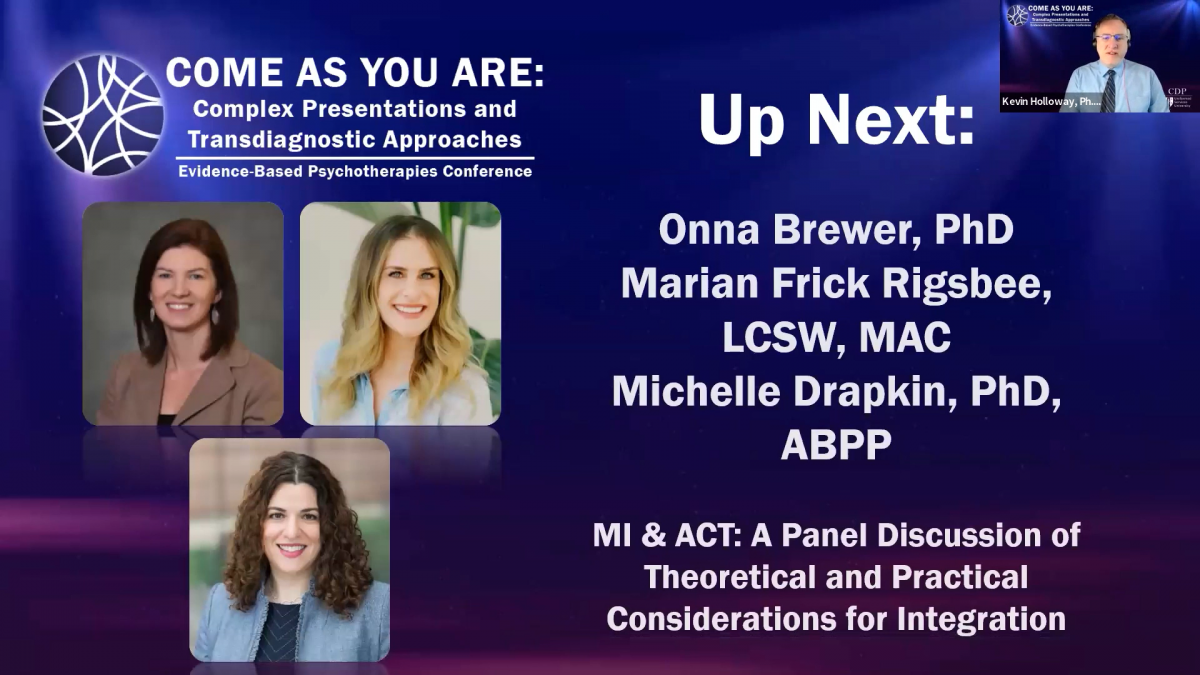 Motivational Interviewing and Acceptance and Commitment Therapy: A Panel Discussion of Theoretical and Practical Considerations for Integration By Onna Brewer, Ph.D., Marian Frick Rigsbee, LCSW, MAC, & Michelle Draper, Ph.D., ABPP: This panel will be a practical and theoretical discussion of experiences and approaches to integrating Acceptance and Commitment Therapy (ACT), a highly theory-driven behavioral intervention and Motivational Interviewing (MI), a style of conversation derived from clinical practice and person-centered counseling and not necessarily a stand-alone behavioral therapy. It will discuss similarities and differences in key concepts within both ACT and MI, including acceptance, values, behavior change, the role of language, and perspective-taking. Panelists will share their experiences working with a range of psychotherapy clients as well as MI learners and discuss how integrating MI and ACT have mutually enhanced and enriched their effectiveness. Questions raised about future directions for transdiagnostic and process-based approaches will also be covered. There will be opportunities for experiential demonstration of ACT and MI together as well as questions from participants.
Motivational Interviewing and Acceptance and Commitment Therapy: A Panel Discussion of Theoretical and Practical Considerations for Integration By Onna Brewer, Ph.D., Marian Frick Rigsbee, LCSW, MAC, & Michelle Draper, Ph.D., ABPP: This panel will be a practical and theoretical discussion of experiences and approaches to integrating Acceptance and Commitment Therapy (ACT), a highly theory-driven behavioral intervention and Motivational Interviewing (MI), a style of conversation derived from clinical practice and person-centered counseling and not necessarily a stand-alone behavioral therapy. It will discuss similarities and differences in key concepts within both ACT and MI, including acceptance, values, behavior change, the role of language, and perspective-taking. Panelists will share their experiences working with a range of psychotherapy clients as well as MI learners and discuss how integrating MI and ACT have mutually enhanced and enriched their effectiveness. Questions raised about future directions for transdiagnostic and process-based approaches will also be covered. There will be opportunities for experiential demonstration of ACT and MI together as well as questions from participants.
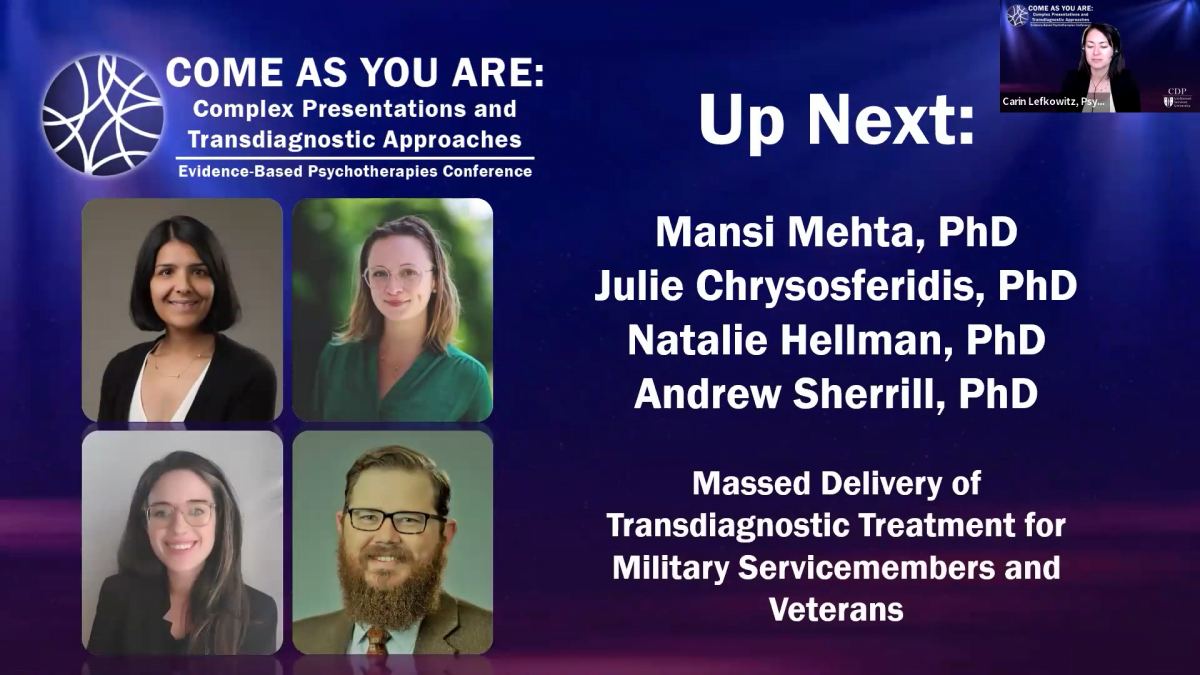 Massed Delivery of Transdiagnostic Treatment for Military Service Members and Veterans by Mansi Mehta, Ph.D., Julie Chrysosferidis, Ph.D., Natalie Hellman, Ph.D., & Andrew Sherrill, Ph.D..: A growing body of evidence supports massed delivery of evidence-based cognitive behavioral therapies (CBTs). While spaced delivery is the conventional paradigm, it can be infeasible due to logistic/financial barriers, varying levels of motivation, and life demands that arise during treatment. Massed delivery treatment mitigates some of these barriers. Current evidence supporting massed delivery of CBTs has investigated disorder-specific protocols; less is known about the feasibility and outcomes of massed delivery of transdiagnostic CBTs. This presentation reviews the rationale for one such treatment, the Unified Protocol for Transdiagnostic Treatment of Emotional Disorders (UP) and examines outcomes of one intensive outpatient program using UP within the service member and veteran population. A discussion of the findings will help to increase awareness of treatment models and improve best practices for this population.
Massed Delivery of Transdiagnostic Treatment for Military Service Members and Veterans by Mansi Mehta, Ph.D., Julie Chrysosferidis, Ph.D., Natalie Hellman, Ph.D., & Andrew Sherrill, Ph.D..: A growing body of evidence supports massed delivery of evidence-based cognitive behavioral therapies (CBTs). While spaced delivery is the conventional paradigm, it can be infeasible due to logistic/financial barriers, varying levels of motivation, and life demands that arise during treatment. Massed delivery treatment mitigates some of these barriers. Current evidence supporting massed delivery of CBTs has investigated disorder-specific protocols; less is known about the feasibility and outcomes of massed delivery of transdiagnostic CBTs. This presentation reviews the rationale for one such treatment, the Unified Protocol for Transdiagnostic Treatment of Emotional Disorders (UP) and examines outcomes of one intensive outpatient program using UP within the service member and veteran population. A discussion of the findings will help to increase awareness of treatment models and improve best practices for this population.
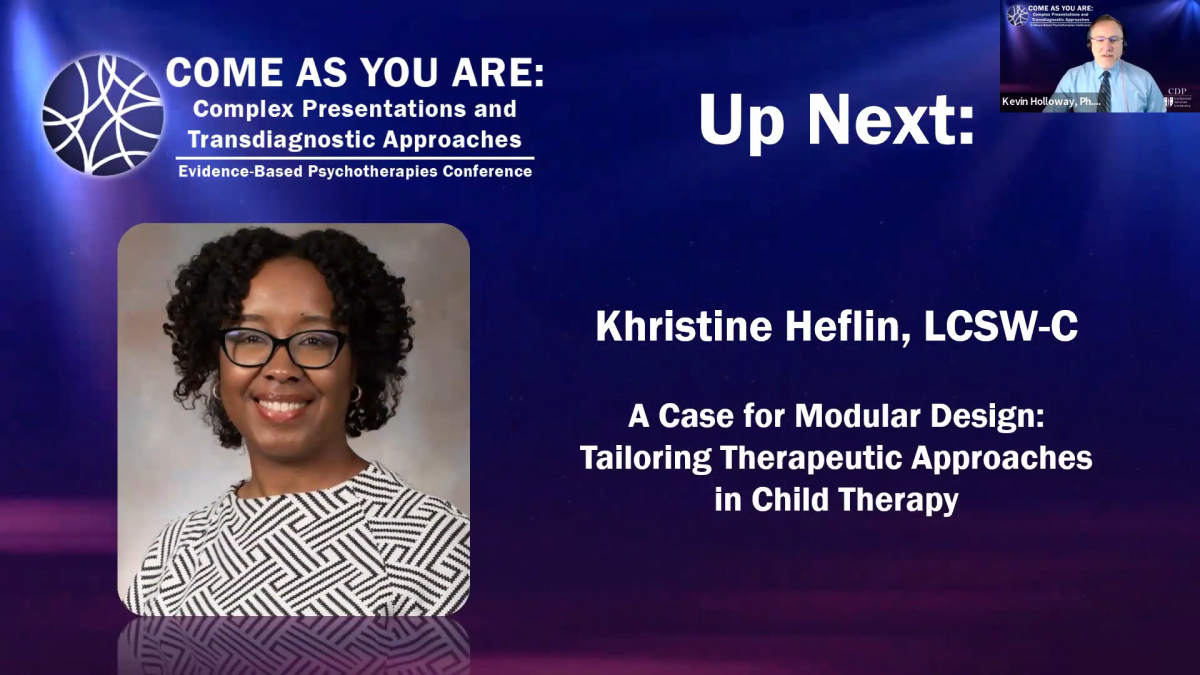 A Case for Modular Design: Tailoring Therapeutic Approaches in Child Therapy by Khristine Heflin, LCSW: Varying clinical needs, psychosocial stressors and comorbid diagnoses are frequent occurrences for clinicians who provide mental health treatment to children and adolescents. Because of these factors, there are challenges with implementing evidence-based treatment in pediatric populations. Providers are often left asking “how do I use an evidence-based treatment that focuses on one problem area at a time, when young people do not present to care in that way’'. MATCH-ADTC was designed as a modular approach to therapy to prevent clinicians from unintentionally adopting an approach that potentially undermines the impact of best clinical practices (Merry et al., 2020). This presentation will include an overview of the modular design, and specific strategies used in MATCH-ADTC. Case examples and experiential exercises will be used to illustrate concepts.
A Case for Modular Design: Tailoring Therapeutic Approaches in Child Therapy by Khristine Heflin, LCSW: Varying clinical needs, psychosocial stressors and comorbid diagnoses are frequent occurrences for clinicians who provide mental health treatment to children and adolescents. Because of these factors, there are challenges with implementing evidence-based treatment in pediatric populations. Providers are often left asking “how do I use an evidence-based treatment that focuses on one problem area at a time, when young people do not present to care in that way’'. MATCH-ADTC was designed as a modular approach to therapy to prevent clinicians from unintentionally adopting an approach that potentially undermines the impact of best clinical practices (Merry et al., 2020). This presentation will include an overview of the modular design, and specific strategies used in MATCH-ADTC. Case examples and experiential exercises will be used to illustrate concepts.
Strategy for Change: Using Conceptualization to Drive Evidence Based Treatment Choices in Complex Cases by Aaron Brinen, Psy.D.: Using evidence-based treatments is vital for robust recovery from mental health struggles. A common chorus is that evidence-based treatments miss the complexities of the real-world cases and therefore do not translate. In this session, we will review how to use evidence based, high fidelity treatment in the real world by using the case conceptualization, shared decision making and strong strategy for change in the most complex cases including PTSD, psychosis, self-injury, and substance misuse.
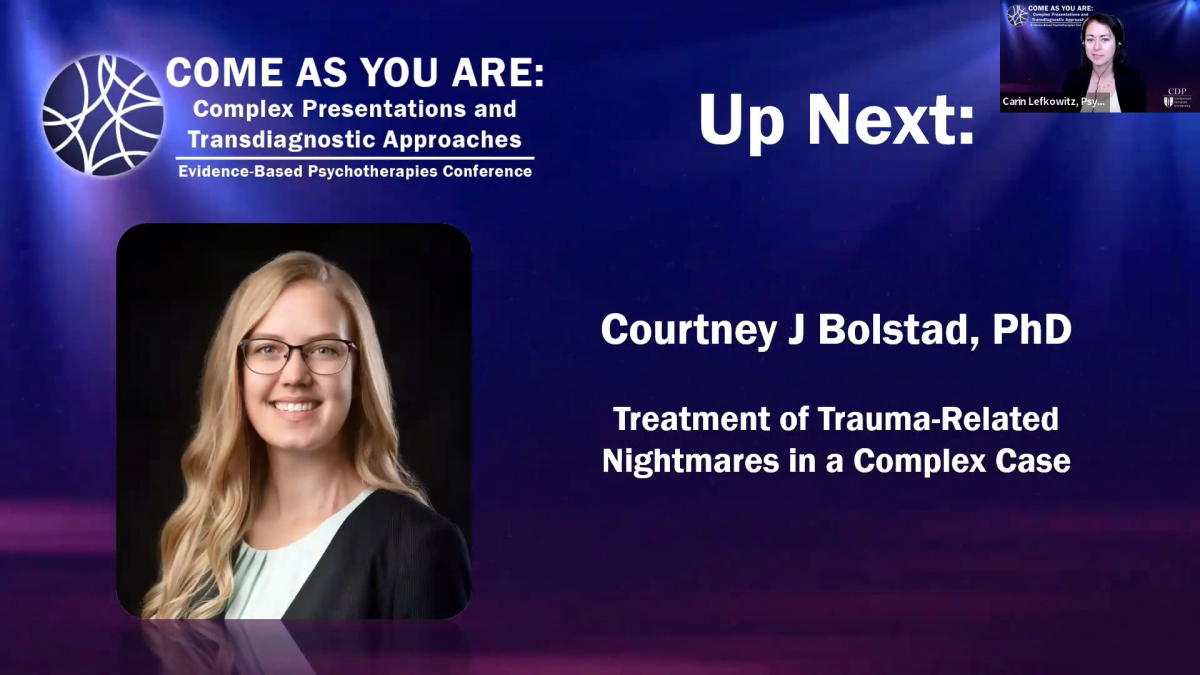 Treatment of Trauma-Related Nightmares in a Complex Case by Courtney J. Bolstad, Ph.D.:Cognitive Behavioral Therapy for Insomnia and Nightmares (CBT-I&N) is an evidence-based treatment for comorbid insomnia and trauma-related nightmares, though few clinicians are trained to provide CBT-I&N, particularly in complex cases. This case presentation will outline how CBT-I&N was used to treat trauma-related nightmares in a young cisgender female adult civilian with a complex presentation. The client sought therapy for nightmares, insomnia, and nocturnal panic attacks, secondary to PTSD. Her complex presentation included anxiety with panic attacks, depression, substance use, restrictive eating, and autism spectrum disorder (requiring support). The presenter will describe the approach to treatment selection, the use of CBT-I&N with the case, and how measurement based care was integrated into the treatment. l Outcomes, including clinically significant reductions on symptom measures and the frequency of nightmares and nocturnal panic attacks, will be discussed.
Treatment of Trauma-Related Nightmares in a Complex Case by Courtney J. Bolstad, Ph.D.:Cognitive Behavioral Therapy for Insomnia and Nightmares (CBT-I&N) is an evidence-based treatment for comorbid insomnia and trauma-related nightmares, though few clinicians are trained to provide CBT-I&N, particularly in complex cases. This case presentation will outline how CBT-I&N was used to treat trauma-related nightmares in a young cisgender female adult civilian with a complex presentation. The client sought therapy for nightmares, insomnia, and nocturnal panic attacks, secondary to PTSD. Her complex presentation included anxiety with panic attacks, depression, substance use, restrictive eating, and autism spectrum disorder (requiring support). The presenter will describe the approach to treatment selection, the use of CBT-I&N with the case, and how measurement based care was integrated into the treatment. l Outcomes, including clinically significant reductions on symptom measures and the frequency of nightmares and nocturnal panic attacks, will be discussed.
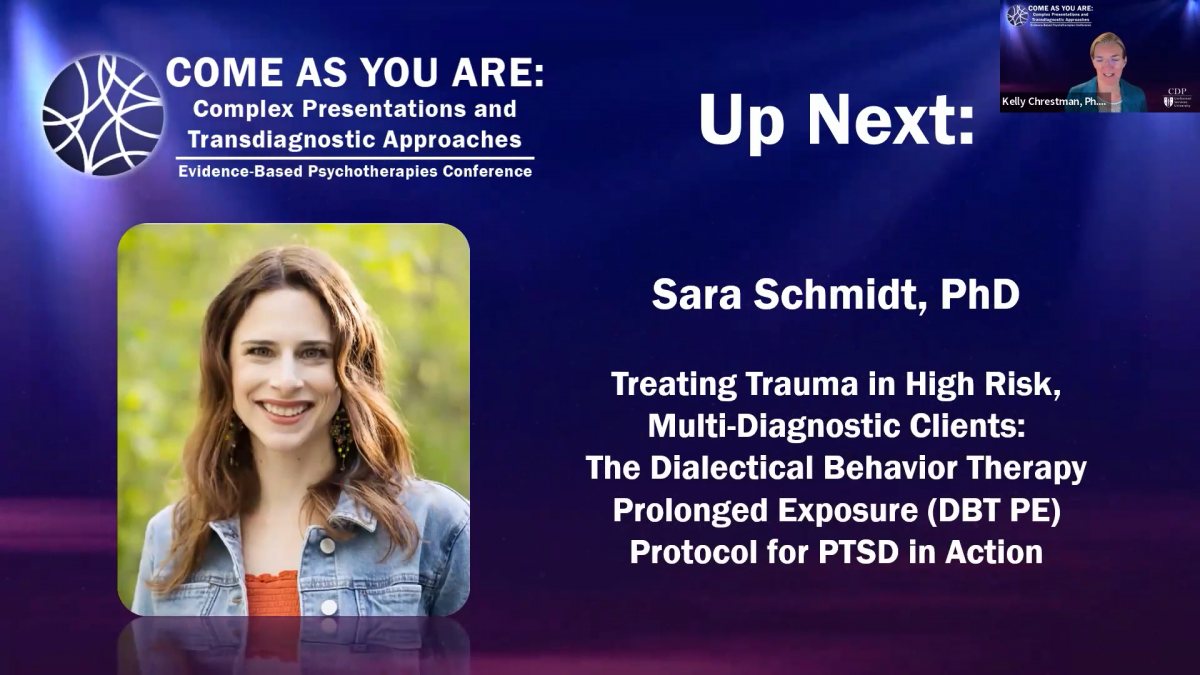 Treating Trauma in High-Risk, Multi-Diagnostic Clients: The Dialectical Behavior Therapy Prolonged Exposure (DBT-PE) Protocol for PTSD in Action by Sara Schmidt, Ph.D.: The Dialectical Behavior Therapy Prolonged Exposure (DBT PE; Harned, 2022) is a treatment for post-traumatic stress disorder (PTSD) that is designed to be added to comprehensive Dialectical Behavior Therapy (DBT), a multi-modal evidence-based treatment for chronically suicidal individuals with severe behavioral dyscontrol and pervasive emotion dysregulation. This presentation will describe the rationale for integrating PTSD treatment into comprehensive DBT, as well as the ways in which the protocol has been adapted from standard prolonged exposure therapy in order to better meet the needs of DBT clients. After describing the principles, structure, and procedures of the DBT PE protocol, a clinical example will be presented.
Treating Trauma in High-Risk, Multi-Diagnostic Clients: The Dialectical Behavior Therapy Prolonged Exposure (DBT-PE) Protocol for PTSD in Action by Sara Schmidt, Ph.D.: The Dialectical Behavior Therapy Prolonged Exposure (DBT PE; Harned, 2022) is a treatment for post-traumatic stress disorder (PTSD) that is designed to be added to comprehensive Dialectical Behavior Therapy (DBT), a multi-modal evidence-based treatment for chronically suicidal individuals with severe behavioral dyscontrol and pervasive emotion dysregulation. This presentation will describe the rationale for integrating PTSD treatment into comprehensive DBT, as well as the ways in which the protocol has been adapted from standard prolonged exposure therapy in order to better meet the needs of DBT clients. After describing the principles, structure, and procedures of the DBT PE protocol, a clinical example will be presented.

